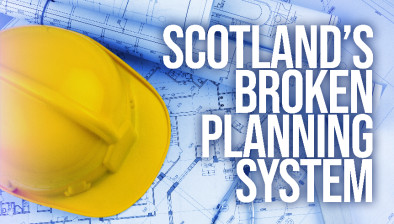Chief planner issues letter in wake of recent court judgement and housing emergency declaration

Minister for public finance Ivan McKee MSP and chief planner Dr Fiona Simpson have issued a letter to stakeholders regarding planning for housing.
Following a recent court judgement and the declaration of the housing emergency, the letter provides further clarification on the implementation of NPF4 and policy 16 Quality Homes and emphasises the need for positive and constructive collaboration across sectors to support delivery.
The letter also highlights a requirement made of planning authorities regarding the Action/ Delivery Programmes that support local development plans.
The letter reads:
Planning for housing
Scotland has declared a national housing emergency. In setting out the Scottish Government’s key priorities, the First Minister confirmed his intention to engage constructively to expand housing supply to meet the needs of the population and tackle homelessness. An all-tenure approach to the provision of new homes, which diversifies supply and provides a mix of tenures, will help to achieve these priorities.
Planning is just one of many factors that impact on the delivery of housing, but it must play its part. Delivery of homes depends on building the confidence of investors – and planning plays a crucial role in this.
Following the Miller Homes vs. Scottish Ministers, XA41/23 court judgement and the more recent declaration of the housing emergency, this letter looks to provide further clarification on application of National Planning Framework 4 (NPF), including Policy 16 ‘Quality Homes’.
Implementation of NPF policy
The Scottish Ministers have continued to reinforce that policies in NPF4 should be read and applied as a whole and that conflicts between policies are normal and to be expected. The planning system requires decision makers to weigh up all relevant policies, for example, quality homes, brownfield development and town centre living, as well as relevant material considerations in applying balanced planning judgement (section 25 of the Town and Country Planning (Scotland) Act, 1997, as amended). The introduction of NPF4 has not changed this.
The approach to planning for housing in NPF4 is different to that in previous, now superseded, Scottish Planning Policy (SPP). The SPP concepts including an effective five-year housing land supply, shortfalls in supply and the tilted balance, no longer apply. The above court judgement confirmed ‘the changes to the development plan move housing policy away from disputes over numbers to an approach which seeks to provide homes in suitable locations’ and that ‘looking at the policies as a whole there is an emphasis on quality, diversity and sustainability’.
The sections on ‘policy intent’ within NPF4 are provided to help decision makers deliver on policy aspirations. The intent of Policy 16 is:
“to encourage, promote and facilitate the delivery of more high quality, affordable and sustainable homes, in the right locations, providing choice across tenures that meet the diverse housing needs of people and communities across Scotland.”
NPF4 expects local development plans to take an ambitious approach, with Local Housing Land Requirements that exceed the MATHLR (Minimum All-Tenure Housing Land Requirement). This expectation is reinforced in published guidance supporting preparation of local development plans. The guidance indicates that the same evidence can be used to inform the MATHLR but that where more recent information is available it should be used. It is expected all information used to inform plan preparation is robust.
An ambitious approach, providing land to accommodate a wide choice of homes across a range of scales of sites and locations, will support the above policy intent. It is vitally important that local development plans are brought forward timeously. On land allocated for housing in local development plans, there is support for development in principle from policy 16 part a).
NPF4 provides at policy 16 part b) for proposals to explain how they will contribute positively to meeting local housing requirements, to local infrastructure services and facilities, and to residential amenity, using new Statements of Community Benefit.
Policy 16 part c) supports proposals that improve affordability and choice, and address identified gaps in provision. A list of examples of the types of proposals this policy could support is provided. In relation to ‘identified gaps in provision’, decision makers may wish to consider the extent to which a proposed development of new homes will contribute to addressing recognised priorities of an area. This can be evidenced by a range of information available on local housing matters, such as Local Housing Strategies, local authority housing emergency action plans or planned actions to support emerging economic opportunities.
Policy 16 part e) supports proposals for new homes where they make provision for affordable homes to meet an identified need and it strengthened contributions to affordable housing from market sites to ‘at least 25%, with flexibility to local circumstances. Policy 16 part f) includes a limited exception that can allow proposals of less than 50 affordable homes on unallocated sites, where they accord with criteria relating to build-out and the plan’s spatial strategy and other relevant policies.
A significant element of the previously mentioned legal case related to policy 16 part f) and a deliverable housing land pipeline. At the same time as publishing this letter, Scottish Ministers have also written to planning authorities to require that action programmes associated with local development plans be reviewed, up-dated and re-published as delivery programmes, and for this to be done by 31 March 2025. Under transitional arrangements, this will ensure they include the sequencing of, and timescale for, the delivery of housing sites allocated in local development plans.
As outlined above, policy 16 contains different parts with some aspects relating to location and others to types of homes. They should be weighed up as relevant to the proposals: there is no hierarchy and no one part of policy should always outweigh others. A balanced planning judgement should be reached in each case.
Positive and constructive collaboration
We are seeking to develop a more positive dialogue on planning for housing, recognising the benefits quality homes and places can bring. We need to find constructive solutions to challenges, and to work collectively on the issues with strong commitment and buy-in across sectors.
The Scottish Government remains committed to working collaboratively with all those with an interest in planning and housing. We are currently giving careful consideration to the Competition and Markets Authority report on the housebuilding sector, and in particular the options put forward on planning.
Late last year, the Planning and Housing Ministers jointly convened a roundtable to consider the issues affecting new homes and possible actions to address them. This group will be reconvened after the Parliamentary summer recess, and in the meantime we are progressing some initial actions. These include:
- convening a discussion on research produced on behalf of Homes for Scotland on housing need
- discussing with SME housebuilders how their experiences of the planning system can be better supported
- working across sectors on the implementation of Statements of Community Benefit for housing proposals
- finalising guidance on Housing Land Audits and seeking to secure support from across sectors to enable their roll out
- promoting place and delivery focused Masterplan Consent Areas in areas seeking to be early adopters of this new tool
The housing emergency is a challenge that must be tackled on many fronts. We intend to work positively and constructively to ensure the planning system contributes all it can to support delivery of the quality homes Scotland needs, where and when they are needed.
We trust the above advice supports this.
Yours faithfully
Dr Fiona Simpson, Chief Planner
Ivan McKee MSP, Minister for Public Finance





















